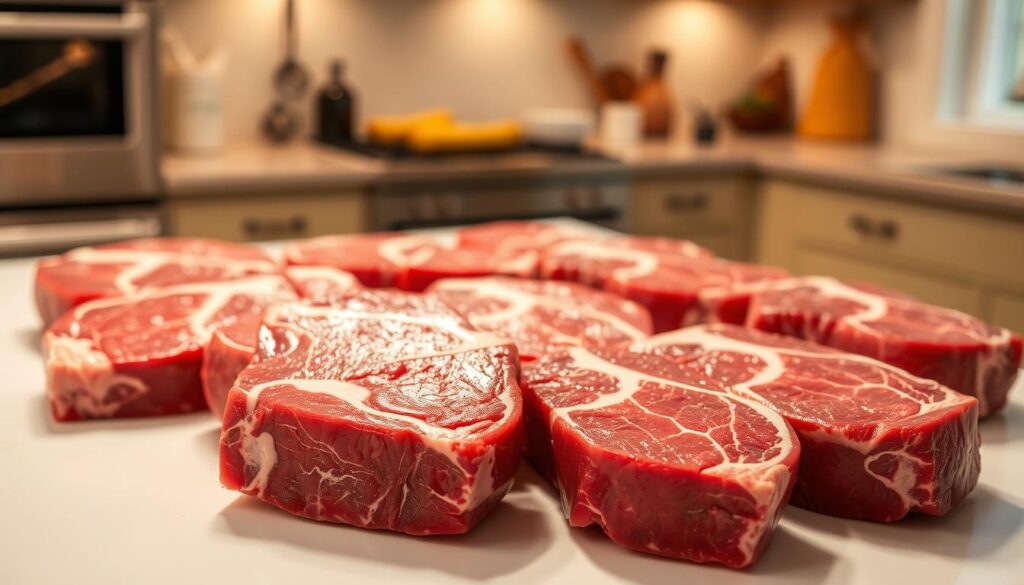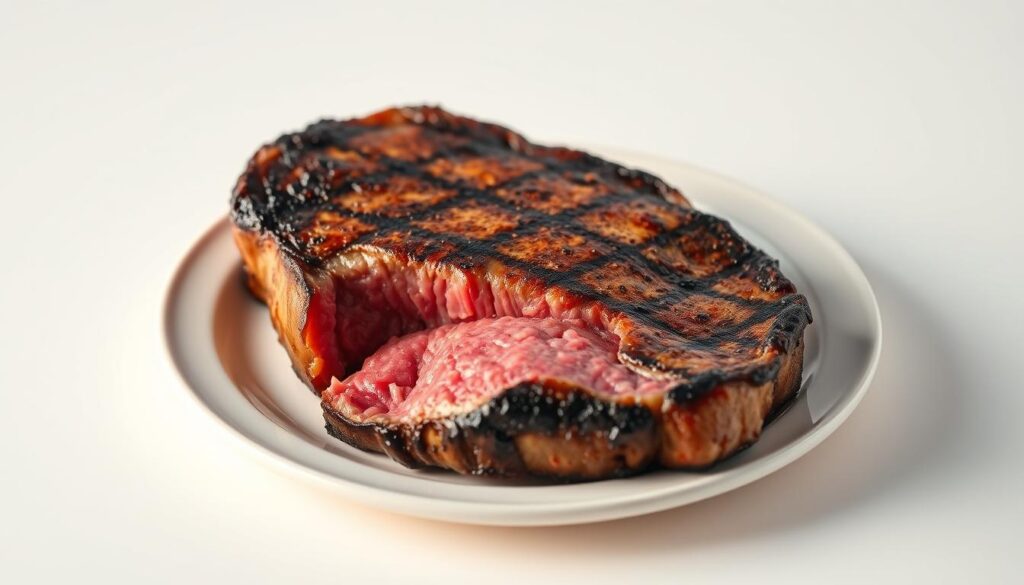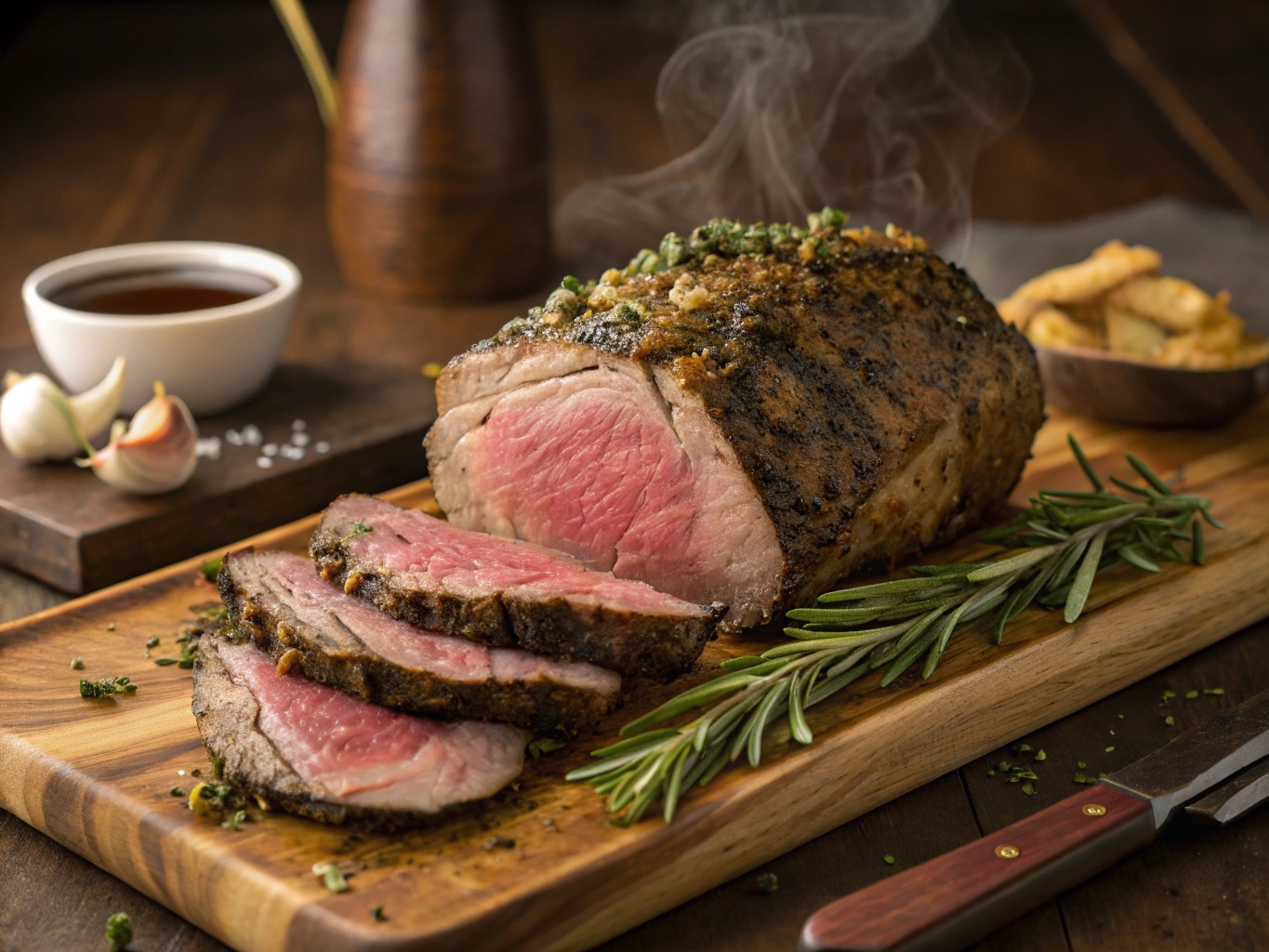The smell of a perfectly cooked ribeye roast makes your home feel like a holiday. When you cut into the meat, it’s not just a meal. It’s a moment that will stay with your family’s hearts and taste buds.
This ribeye roast recipe is more than food. It’s about making memories and bringing people together at dinner.
“Is ribeye good for roast?” Yes, it is! A ribeye roast is perfect for any dinner party. It’s juicy and flavorful, and easy to make at home.
Whether you’re a pro in the kitchen or new to cooking, this guide will help you make a great ribeye roast. We’ll show you how to pick the right cut and cook it just right. You’ll impress your guests and enjoy a delicious meal.
Key Takeaways
- Ribeye roast is an excellent choice for roasting due to its marbling and flavor.
- A 3-pound ribeye roast typically serves 8 people.
- Cooking time is about 75 minutes for a medium-rare 3-pound roast.
- The ideal internal temperature for medium-rare is 135°F.
- Resting the roast for 30 minutes after cooking is key for juiciness.
- Leftovers can be safely stored in the refrigerator for 3-4 days.
- Proper seasoning and preparation are key to enhance the roast’s natural flavors.
Understanding Ribeye Roast vs Prime Rib
Many meat lovers wonder if a ribeye roast is the same as prime rib. While both come from the cow’s rib section, they differ in key ways.
Key Differences Between Cuts
The main difference is the bone. Ribeye roast is boneless, while prime rib has a bone. This changes how they look, cook, and taste.
| Feature | Ribeye Roast | Prime Rib |
|---|---|---|
| Bone | Boneless | Bone-in |
| Weight | Up to 25 pounds | Up to 16 pounds |
| Cooking Time | Shorter | Longer |
| Flavor | Rich | Richer due to bone |
Why Choose Ribeye Roast
Ribeye roast has its perks. It’s boneless, making it easy to carve and cook evenly. It’s great for those who want a quicker, leaner meal.
Meat Grade Selection Tips
When picking a ribeye roast, check the marbling and color. Look for fat evenly spread for flavor and tenderness. A bright red color means it’s fresh. The meat’s grade impacts taste and price, so choose wisely.
Essential Ingredients for Perfect Ribeye Roast
To make a delicious ribeye roast, start with the right ingredients. Your choice of meat and seasonings is key. Let’s look at what makes a great roast.
Choosing the Right Cut
For a tasty ribeye roast, choose a 3-4 pound boneless cut. This size is perfect for about eight people. Opt for USDA Prime beef for the best flavor and marbling.

Seasoning Components
A simple yet tasty seasoning blend is essential. Here’s a basic rub to boost the meat’s flavor:
- 1/2 cup kosher salt
- 2 teaspoons ground black pepper
- 1 teaspoon garlic powder
- 1 teaspoon dried thyme
- 1 teaspoon dried rosemary
Optional Flavor Enhancers
For an extra boost, try these ingredients:
| Ingredient | Amount | Purpose |
|---|---|---|
| Olive oil | 6 tablespoons | For searing and basting |
| Minced garlic | 1/2 cup | For added flavor |
| Tri-color peppercorns | 4 tablespoons | For a peppery crust |
| Light brown sugar | 2 tablespoons | For caramelization |
Quality ingredients and proper seasoning are the secrets to a great ribeye roast. With these tips, you’re ready to make a memorable meal.
Kitchen Tools and Equipment Needed
To cook ribeye best, you need the right tools. A good roasting pan with a rack is essential. It helps air circulate, ensuring even cooking.
A meat thermometer is a must-have for perfect doneness. You’ll want to remove the roast at 120°F for medium-rare, letting it rest to 127-130°F.
Kitchen twine helps shape your roast for even cooking. A sharp carving knife makes serving easy. Don’t forget heavy-duty aluminum foil for resting your roast. It keeps the meat warm and juicy.
- Roasting pan with rack
- Meat thermometer
- Kitchen twine
- Sharp carving knife
- Heavy-duty aluminum foil
With these tools, you’re set to cook a perfect ribeye roast. Remember, the key to how ribeye is best cooked lies in temperature control and proper resting. Use your thermometer to hit 120°F, then let it rest for 20-30 minutes.
This method ensures a juicy, flavorful roast every time.
Preparing Your Ribeye Roast Recipe
Learning how to prepare a ribeye roast recipe is essential for a delicious dish. Let’s explore the key steps to prepare your roast for the oven.
Room Temperature Guidelines
Let your ribeye roast sit at room temperature for 90 minutes before cooking. This step ensures the meat cooks evenly. Always remember, don’t leave the roast out for more than 2 hours for food safety.
Seasoning Techniques
Seasoning is key for a tasty ribeye roast. Rub a lot of your favorite dry rub into the meat. Press it in well to let the flavors soak deep into the meat.
Garlic Butter Application
Adding garlic butter can make your roast even richer. Mix softened butter with minced garlic, herbs, and a bit of salt. Spread this mix all over the roast before you cook it.
| Preparation Step | Time | Purpose |
|---|---|---|
| Room Temperature Rest | 90 minutes | Even cooking |
| Seasoning Application | 5-10 minutes | Flavor enhancement |
| Garlic Butter Spread | 5 minutes | Added richness |
With these steps, your ribeye roast is ready to cook. The prep work might take some time. But it’s all worth it for a perfectly seasoned, juicy roast that will wow your guests.
Temperature and Timing Guide
Learning to cook the perfect ribeye roast is all about the right temperatures and timing. What temperature should ribeye roast be cooked at? Let’s explore the key steps for the best results.
Initial Searing Temperature
Begin by searing your ribeye roast at a high heat. Heat your oven to 500°F (260°C) for a crispy outside. Sear the roast for about 2½ minutes on each side to keep the juices in.
Slow Roasting Phase
Once seared, lower the oven to 225°F (107°C) for slow roasting. This lower heat ensures even cooking. A 5-pound roast will take up to 3.5 hours to cook.
Internal Temperature Goals
Use a meat thermometer to check the roast’s internal temperature. For medium-rare, aim for 125°F (52°C). For medium, target 130°F (54°C). The temperature will rise 5-8°F while resting.
| Doneness | Internal Temp | Final Temp After Resting |
|---|---|---|
| Medium Rare | 125°F (52°C) | 130-134°F (55-57°C) |
| Medium | 130°F (54°C) | 135-140°F (58-60°C) |
Let your roast rest for 20-30 minutes after cooking. This lets the juices spread, making the roast moist and flavorful.
Step-by-Step Cooking Method
Wondering how to cook a ribeye perfectly? Follow this easy method for a delicious roast every time. First, heat your oven to 500°F. While it warms up, dry your ribeye with paper towels and season well.
Put the roast in a roasting pan, fat side up. Sear it at 500°F for 20 minutes to get a tasty crust. Then, lower the oven to 325°F for slow roasting.
Keep cooking until it’s cooked to your liking. Here’s a guide for a 2½-pound roast:
- Rare (130°F): 45 minutes
- Medium-rare (140°F): 55 minutes
- Medium (145°F): 60 minutes
For bigger roasts, add 20-30 minutes for each extra pound. Remember, the temperature will go up 4-8°F after you take it out of the oven.

Let the roast rest for 15-20 minutes before cutting. This makes it juicy and full of flavor. Cut against the grain and serve right away.
| Doneness | Internal Temperature | Total Cooking Time |
|---|---|---|
| Rare | 130°F | 60-65 minutes |
| Medium-rare | 140°F | 65-75 minutes |
| Medium | 145°F | 75-85 minutes |
Resting and Carving Techniques
After you’ve made your ribeye roast recipe, the last steps are very important. Resting and carving right will make your roast juicy and tender. Let’s look at the techniques that will make your ribeye roast the main attraction at any meal.
Proper Resting Time
Being patient is key when resting your ribeye roast. Let it rest for 30 minutes after taking it out of the oven. This time lets the juices spread out in the meat, making it more flavorful and tender. Remember, the meat will get about 10 degrees warmer during this resting time.
Carving Direction
When carving, cut against the grain for the best tenderness. Use a sharp knife and cut thin, even slices. A 5-pound ribeye roast will give you about 10 servings, with each person getting about 1/2 pound of meat.
Serving Recommendations
Put your carved ribeye roast on a warm platter. Add fresh herbs for color and flavor. Serve it right away to enjoy it at its best. Pair it with classic sides like roasted potatoes and vegetables to finish your ribeye roast recipe.
- Nutritional info per serving: 721 kcal, 31g protein, 65g fat
- Best for medium-rare: 120-125°F in-oven temperature
- Serve bone-in roast: About 2 servings per rib
Perfect Side Dish Pairings
Is ribeye good for roast? Absolutely! Pairing it with the right side dishes makes your meal even better. Let’s look at some tasty options that go well with your roast.
Try creamy mashed potatoes for a classic choice. You can make it even better with a Mashed Potato Casserole. Add bacon, cheese, and crispy onions for extra taste. Or, go for Ranch Potatoes seasoned with buttermilk ranch dressing if you’re in a hurry.
Roasted vegetables are also great. Roasted Carrots with Honey Herb Butter are sweet and savory. Maple Bacon Brussels Sprouts add a smoky flavor. For something different, try Roasted Delicata Squash with its edible skin and parmesan crust.
Green vegetables offer a fresh contrast to the rich ribeye. Sautéed Green Beans with Pomegranates have a unique taste. Or, try slow-cooker green beans in tomato sauce with crispy bacon. A Caesar Salad with homemade dressing is quick and impressive.
Don’t forget the bread! Cheddar Biscuits or Herb Focaccia with rosemary, thyme, sage, and parsley are perfect. These sides not only make your meal better but also show why ribeye is great for roast dinners.
Sauce and Seasoning Accompaniments
Make your ribeye roast recipe even better with tasty sauces and seasonings. The right mix can turn a good roast into a memorable meal. Let’s look at some classic and new ways to add flavor to your beef.
Classic Au Jus
Au jus means “with juice” in French. It’s a light gravy made from the roast’s drippings. First, strain the juices and remove excess fat. Then, simmer with beef broth for 5 minutes, adding salt and pepper to taste. This sauce brings out the best in your ribeye roast.
Complementary Sauces
Try these tasty sauces to add more flavor:
- Creamy Horseradish Sauce: Mix sour cream, horseradish, and lemon juice. It’s ready in 15 minutes.
- Mushroom Sauce: Cook mushrooms in butter, then add heavy cream. It’s a perfect match for beef.
- Gremolata: Mix parsley, lemon zest, and garlic. Adding horseradish makes it even more flavorful.
Seasoning Options
Finish your ribeye roast with these seasonings:
| Seasoning | Flavor Profile | Best Used |
|---|---|---|
| Flaky Sea Salt | Crunchy, clean | Just before serving |
| Cracked Black Pepper | Spicy, aromatic | During cooking or serving |
| Herb Butter | Rich, herbal | Melted over hot slices |
Compound butter can be frozen for up to 6 months. It’s great for future meals.
Storage and Leftover Tips
Wondering how to keep your ribeye roast fresh? You can enjoy it for more than one meal. Store leftovers in an airtight container in the fridge for up to 4 days. For longer storage, wrap it tightly in plastic wrap and freeze for up to 6 months.
To reheat, preheat your oven to 250°F. Place the leftover ribeye in a baking dish, cover with foil, and add a splash of beef broth. This method keeps the meat soft and tender. Remember, reheating quickly is key to enjoying your ribeye as leftovers.
Be creative with your leftovers! Slice the ribeye thinly for sandwiches, chop it for tacos, or dice it for soups. For a quick meal, toss cubed ribeye into pasta or use it on a salad. If it was cooked well-done, use it in sauces to keep it moist. With these tips, every bite will be as good as the first.
FAQ
Is a ribeye roast the same thing as prime rib?
How is ribeye best cooked?
Is ribeye good for roast?
What temperature should ribeye roast be cooked at?
How long should I let the ribeye roast rest before carving?
What are some good side dishes to serve with ribeye roast?
How do I store leftover ribeye roast?
Explore More Delicious Recipes on YumeRecipes!
If you enjoyed this recipe, you’ll love these other dishes: try our comforting Artisan Vegan Jalapeno Cheddar Bread Recipe .For a cozy meal, or whip up some Halibut Fish Taco: The Best Taco Ever Made
for a quick and flavorful dinner. For dessert, indulge in our Fudgy Weed Brownies: The Ultimate Marijuana Edible or try a refreshing Immunity Shots Recipe: Revitalize Your Health . Visit YumeRecipes for even more tasty ideas!

